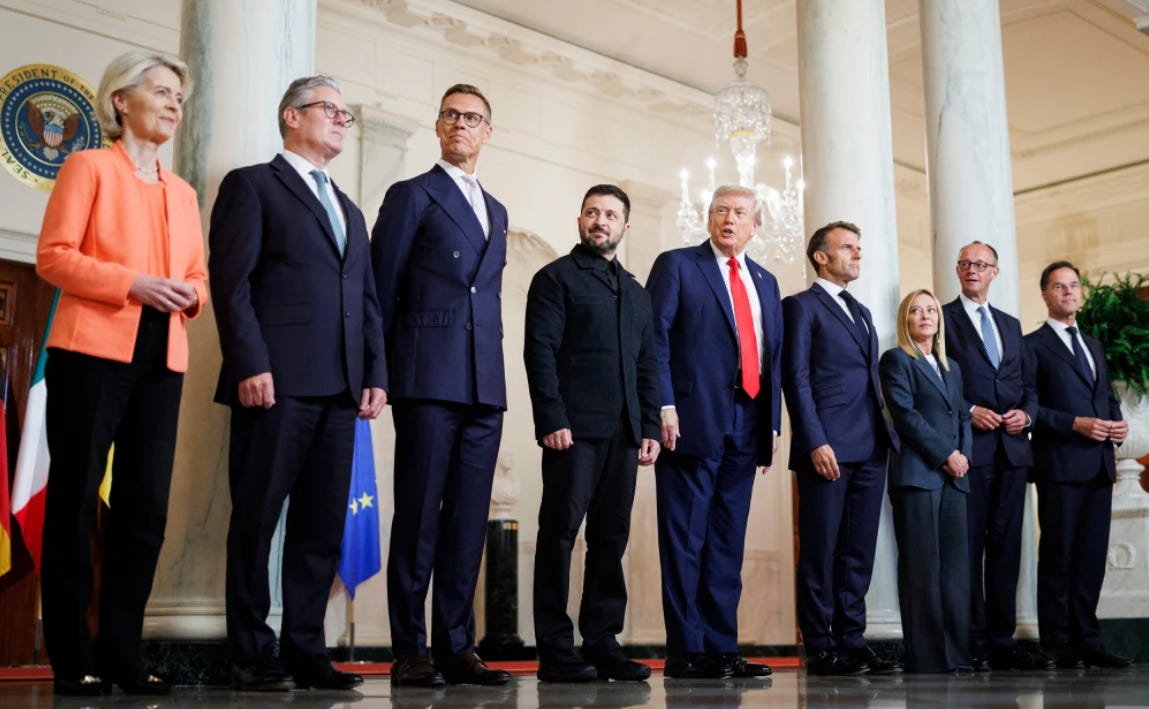US Hosts Zelensky and EU Leaders, Penny Stock Fraud Hits Retail Investors, Norway’s Sovereign Fund to Divest from Israeli Firms, Xi Visits Tibet, and Key Market Signals from Jackson Hole, and More
Grinfi Political Risk Intelligence Briefing
Welcome to this week’s edition of Grinfi Political Risk Edge, your trusted source for expert political risk analysis and strategic intelligence. Thorough, insightful, and industry-focused. In this issue, we examine key geopolitical events shaping global markets and provide deep, beyond-the-headlines assessment. We deliver clarity in uncertainty and strength in decision-making. Anticipate, Adapt, and Excel!
But first, let’s begin the week with a laugh 😄 to brighten the mood.
Help us serve you better and improve Grinfi Political Risk Edge by taking this brief, fully anonymized reader survey.
"So that in the first place, I put for a general inclination of all mankind, a perpetual and restless desire of power after power, that ceaseth only in death."
Thomas Hobbes, Leviathan. Edited by Richard Tuck. Cambridge: Cambridge University Press, 1991. Originally published 1651.
Disclaimer: The opinion expressed in this quote does not represent our views but is intended for reflection purposes only.
From Grinfi Political Risk Observatory (GPRO), here’s what we’re monitoring:
High Impact Situational Updates
EXECUTIVE SUMMARY
Last week, several strategic events reshaped the global risk environment with direct consequences for security, markets, and regulation.
“At Grinfi, we track immediate/direct fragility and systemic contagion (cascading effect), ensuring leaders see risks before they spread.”
In Washington, the United States hosted President Zelensky and European leaders, endorsing a European-led framework for Ukraine’s security while keeping its own role deliberately undefined, thus maintaining a posture of strategic ambiguity. In Africa, the M23 rebel group suspended peace talks with the Congolese government, intensifying instability in eastern Congo and threatening access to cobalt and copper vital to global supply chains.
Norway’s sovereign wealth fund advanced divestments from Israeli companies tied to West Bank and Gaza activities, setting a precedent likely to influence other European institutional investors. In Asia, President Xi Jinping’s visit to Tibet emphasized Beijing’s focus on large-scale infrastructure and stronger state control, a signal with implications for India–China relations. Japan used the TICAD 9 summit in Yokohama to pivot from aid toward trade and development finance through investment-led partnerships in Africa, pledging billions in development loans and training programs in advanced technologies.
In Europe, Switzerland’s parliament advanced legislation to abolish the “marriage penalty,” a system that taxed married couples jointly and often at higher rates than singles. The proposed shift to individual taxation is intended to increase labor force participation, but opponents have already mobilized for a referendum, setting the stage for a national vote.
Financial markets rallied after the Federal Reserve Chair’s Jackson Hole remarks on August 22, which opened the door to near-term rate cuts despite persistent inflationary pressures. At the same time, manipulation in U.S.-listed Chinese microcap stocks wiped out billions in value. These schemes targeted retail traders who rely heavily on social media hypes for investment tips, leaving many trapped in collapsing stocks and prompting regulators to confront gaps in market oversight.
The week’s events divulged five clear signals: Europe is being positioned to take primary responsibility for Ukraine’s security, prospects for direct bilateral, trilateral, and multilateral talks on the Russia–Ukraine war are becoming more likely, resource supply chains in DR Congo are under mounting pressure, Switzerland faces a decisive tax reform debate, and U.S. monetary policy is tilting toward easing while regulators crack down on market fraud. As it appears, financial conditions, regulatory oversight, and supply chains are mostly tightening, though the impact is not uniform across markets.
MAJOR HEADLINES [Risk Breakdown]
Geopolitical Risk
Aug 18, Washington: United States hosted President Zelensky and European leaders to discuss Russia’s position and coordinate on security guarantees for Ukraine.
Aug 20–21, Lhasa: President Xi Jinping visited Tibet to consolidate Chinese control, promising development, infrastructure, socialism, and long-term energy projects, a move viewed unfavorably by India. The visit coincided with renewed diplomatic contacts between China and India.
Aug 20–22, Yokohama: Japan convened TICAD 9, pledging over $5 billion in development loans and a large AI training initiative for Africa.
Domestic Risk
Aug 18–19 Kinshasa: The M23 rebels group suspended peace talks with the government of the Democratic Republic of Congo, with renewed fighting in eastern Congo.
Market and Regulatory Risks
Aug 18, Oslo: Norway’s Government Pension Fund Global divested from Israeli holdings with ties to the Israeli government’s activities in the West Bank and Gaza Strip.
New York: Coordinated penny stock manipulation in U.S.-listed Chinese microcaps erased billions in investor value. The issue was first revealed in a Financial Times investigation earlier in the week.
Aug 22, Jackson Hole: The Federal Reserve Chair signaled a potential move toward September rate cuts, boosting global markets.
End of Free Briefing
👉 Become a paid subscriber today to gain complete and unrestricted access to the full briefing with detailed strategic takeaways, sector-specific action roadmaps, board-ready guidance, and our comprehensive market summary, as well as the exclusive France-special section: L’observatoire Decisif.


